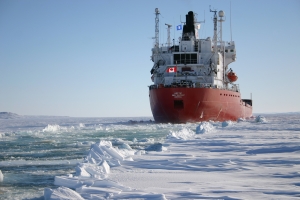


(Posted on 11/11/19)
Maritime trade between Arctic destinations and the rest of the world is expected to expand and an increasing number of ships are now undertaking voyages in polar waters. Technical developments in ship design and equipment continue to facilitate more and more ship operations in remote polar areas, despite challenging and unpredictable sea and weather conditions.
The International Code for Ships Operating in Polar Waters (Polar Code), adopted by the UN International Maritime Organization (IMO), requires shipping companies intending to operate in polar waters to develop a Polar Water Operational Manual (PWOM) in order for their ships to be issued with a Polar Ship Certificate.
New joint guidelines from the International Chamber of Shipping (ICS) and the Oil Companies International Marine Forum (OCIMF) aim to support shipping companies by providing advice on how to develop a PWOM that best suits their needs.
Appendix II of the IMO Polar Code already provides a model PWOM. ICS and OCIMF have recognised that additional guidance is necessary to help shipping companies to develop a quality PWOM that is truly fit for purpose.
In extreme conditions, and especially in ice, the way in which a ship is operated is critical for safety and environmental protection.
The purpose of the new Guidelines is to provide the means for shipping companies and Masters to develop a comprehensive PWOM tailored to the needs of their individual ships, taking into account the environmental hazards and the nature of their operations.
Guidelines for the Development of a Polar Water Operational Manual has been prepared by expert contributors with in-depth experience of operating ships in polar waters, as well as knowledge of the challenges faced by seafarers on board.
Topics addressed include: identifying hazards; understanding operational limitations; updating procedures; upgrading equipment and systems; understanding relevant legislation and ensuring that the results of assessments are fully addressed in the PWOM.
Available free of charge, the ICS/OCIMF Guidelines can be downloaded from the ICS and OCIMF websites and the Arctic Shipping Best Practice Information Forum (ASBPIF) web portal.
AtoB@C Shipping, a subsidiary of ESL Shipping, has announced the successful delivery of Fleximar, the... Read more
Western Bulk, together with reputable Norwegian partners A/S J. Ludwig Mowinckels Rederi, Premium Maritime... Read more
Pacific Basin Shipping Limited, one of the world’s leading dry bulk shipping companies, has announced... Read more
Columbia Group anticipates a period of strong expansion as an increasing number of international shipowners... Read more
Norse?Ship Management has expanded its use of Smart Ship Hub’s high frequency sensor data and... Read more
As the maritime industry gears up to welcome the IMO’s STCW bullying and harassment training amendments... Read more
NORDEN has acquired the cargo activities of Taylor Maritime in Southern Africa (previously operated... Read more
Philippos Ioulianou, Managing Director of EmissionLink, has warned the IMO’s decision to delay... Read more
VIKAND has highlighted the need for cultural change in the maritime sector as reports of bullying, harassment... Read more
The maritime industry is experiencing a period of significant transformation, driven by rapidly evolving... Read more